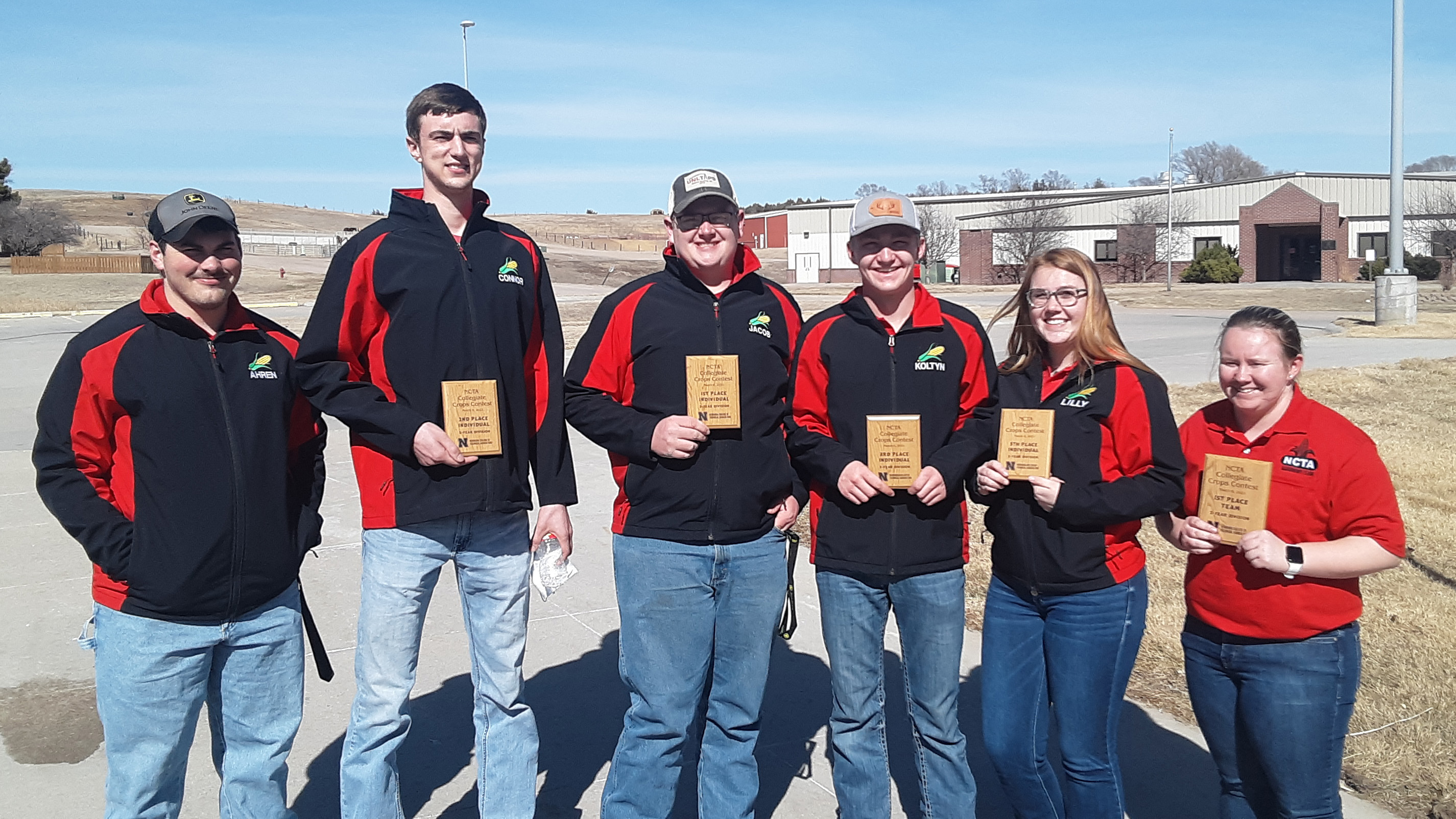NCTA hosts, wins agronomy contest

April 5, 2021
By NCTA News
CURTIS, Neb. – The “home team” at the first in-person, regional collegiate crops judging contest of 2021 won the 2-year college division at the Nebraska College of Technical Agriculture.
The NCTA Aggie team topped 2-year schools, while Iowa State University team won the 4-year division.
Nine universities and colleges from Nebraska, Kansas, Iowa, Oklahoma, Texas, and Wisconsin traveled to Curtis for the daylong contest organized by Brad Ramsdale, NCTA agronomy professor and crops judging team coach.
“It was amazing to compete in-person, not virtually,” said Lilly Calkins, an NCTA sophomore from Palmyra, Nebraska. She placed 5th individually and was on the winning NCTA Team.
Individually, four NCTA students on the first-place team also did quite well. Earning honors were, 1st-Jacob Jenkins of Mitchell; 2nd-Connor Nolan of Lynch, 3rd-Koltyn Forbes of Wood River, and 5th-Lilly Calkins of Palmyra.
Also participating from NCTA in an unofficial capacity were freshmen Ahren Marburger of Malvern, Iowa, and Allison Wilkens of Gibbon.
Crops contests focus on knowledge and skill requirements to become a certified crop advisor. Four parts are agronomic exam, math practical, lab practical, and plant and seed identification.
“The contest was set up very well, and the other schools were prepared, but I like to think our team’s time and dedication really showed. I couldn’t be more proud of my team and our accomplishments,” Calkins said.
Upon graduation in May, Calkins is prepared for a career in agronomic research or as a crops consultant.
Team leader Jacob Jenkins, also a sophomore, said it was both exciting and rewarding to place at the top as a team and individually.
Jenkins is a diversified agriculture major graduating in May. The crop production skills and livestock management he gains at NCTA are important to his family’s crops and livestock operation in western Nebraska.
Connor Nolan, a sophomore from Lynch, will graduate in May, then go on to UNL in the fall to study agronomy.
Calkins, Nolan, and Jenkins, current sophomores, began their agronomy courses at NCTA as freshmen in the fall of 2019. They were able to participate, but not compete for contest points, in 2020 contests at Oklahoma Panhandle State University at Goodwell in February and then at NCTA on March 10. But, before the Aggies could go on to the national contest that was to be in Kansas that April, the global pandemic halted everything.
That’s why the in-person contest at NCTA, nearly a year later, was special to the sophomores. COVID protocols in Southwest Nebraska enabled NCTA to be hosts on March 6 and draw about 60 contestants. The Aggie sophomores finally got to put their knowledge to the test in an official contest.
“We were fortunate to be able to host an in-person event here in Curtis and provide a strong competition for the schools throughout the Midwest that were approved to travel and compete,” said Ramsdale.
Those with the farthest travel were Wisconsin and Texas.
Students have one hour to complete each of the four contest categories:
- Agronomic Exam – this is a comprehensive exam overall knowledge in the field of agronomy. The exam includes 75 multiple choice questions.
- Math Practical – an exam that encompasses all possible mathematical problems in agronomy. Example calculations include seeding rates, fertilizer application rates, sprayer calibration, harvest losses, irrigation scheduling, grain moisture adjustments and livestock rations.
- Lab Practical – an exam that includes 75 specimens that can range from insect, disease and equipment identification; crop growth staging; pesticide labels; nutrient deficiency symptoms, fertilizer samples, and many more.
- Plant and Seed Identification – a 75-specimen exam of crop and weed plants and seeds. The exam has over 150 possible species.
Ramsdale said any student at NCTA can participate in the Crops Judging team by enrolling in AGR 1891 Crops Judging I, fall semester, and AGR 2892 Crops Judging II, spring semester.
Part of the University of Nebraska system, the Nebraska College of Technical Agriculture is a two-year institution with a statewide mission of preparing students for successful careers in agriculture, veterinary technology and related industries. NCTA is known for its affordable tuition, high job-placement rate for its graduates, and for the success of student teams in competitive activities including crops judging, ranch horse events, livestock judging, shotgun sports, stock dog trials, and intercollegiate rodeo. The college is consistently ranked as one of the best two-year schools in the nation.
Download a PDF of this press release